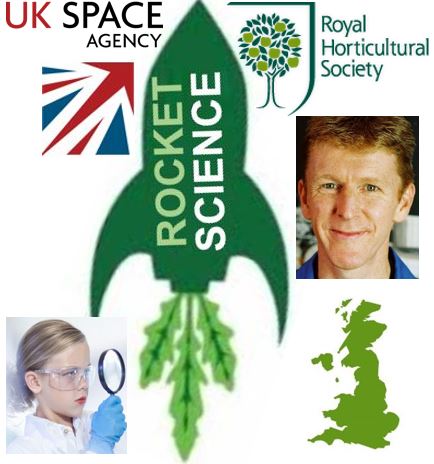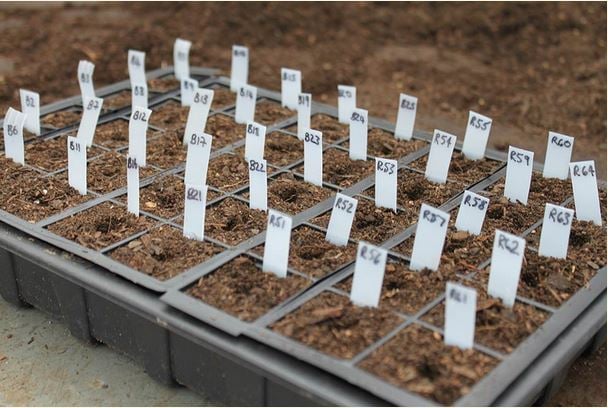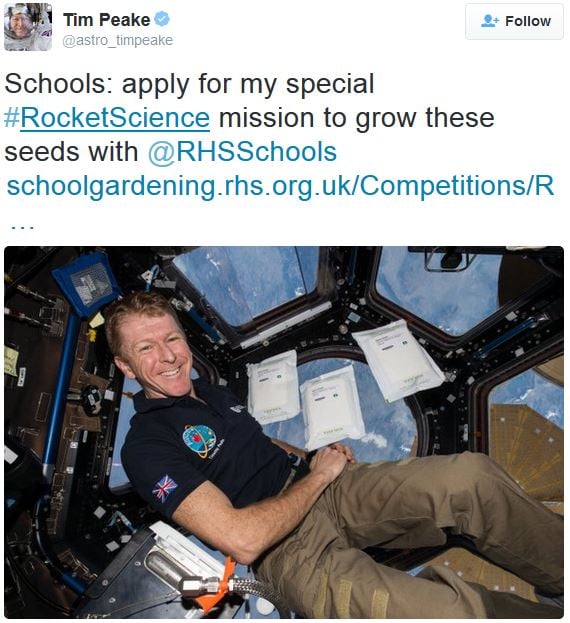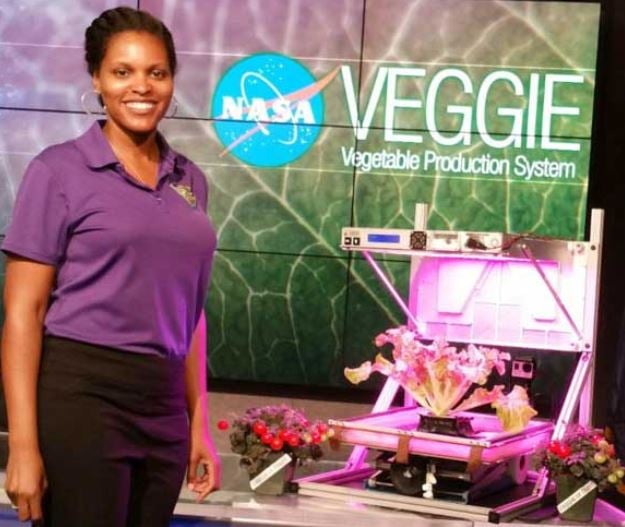A massive space gardening experiment – called Rocket Science – will be underway soon, and British astronaut Tim Peake is asking thousands of British kids to help him out. He says up to half-a-million UK pupils are likely to be involved in this nationwide space biology trial.
Major Peake, who is aboard the International Space Station, which is orbiting the Earth, is holding onto 2 kg of rocket seeds. In March or April they will be taken back to Earth and sent to thousands of schools across the UK.
Teachers and pupils will plant the rocket seeds, as well as seeds that remained on Earth, and tell Major Peake, the UK Space Agency, and the British Horticultural Society how well the sprouting plants have grown.
 Astronaut Tim Peake, the UK Space Agency and the British Horticultural Society invite British pupils to become space biologists. (Image adapted from www.gov.uk)
Astronaut Tim Peake, the UK Space Agency and the British Horticultural Society invite British pupils to become space biologists. (Image adapted from www.gov.uk)
Comparing space and Earth seeds
Rocket Science is a space-biology trial that aims to compare how space seeds and Earth seeds perform both in orbit and on Earth.
Major Peake has sent a video message from the International Space Station (see bottom of page) highlighting details of the project. Schools across the country are currently being approached by the British Horticultural Society and the UK Space Agency – the organisers of the experiment.
Space agencies across the world, including America’s NASA, Europe’s ESA, Russia’s Roscosmos, and Japan’s JAXA want to know whether and how astronauts in deep space missions, such as the one planned for Mars, can grow their own food in space.
Rocket Science forms part of a series of experiments which aim to answer all these space gardening questions.
Rocket Science turns pupils into space biologists
Rocket Science allows up to half-a-million British pupils to become space biologists by growing space seeds and comparing them to Earth seeds.
 The Royal Horticultural Society says “A group of pupils will need to be identified to perform the experiment. This could be a class, STEM club, gardening club or other group. It is envisaged that this group will also present its findings to the wider school, for example through an assembly.” (Image: schoolgardening.rhs.org.uk)
The Royal Horticultural Society says “A group of pupils will need to be identified to perform the experiment. This could be a class, STEM club, gardening club or other group. It is envisaged that this group will also present its findings to the wider school, for example through an assembly.” (Image: schoolgardening.rhs.org.uk)
In September 2015, two kilograms of rocket seeds were flown to the International Space Station (ISS), where they will remain in orbit, in a weightless environment, until March/April this year.
In April, up to 10,000 schools and educational centres in the UK will grow the space and Earth seeds in a nationwide experiment.
The UK Space Agency together with the Royal Horticultural Society will send out teaching packs to the participating schools and educational groups.
The teaching packs will contain: 1. Seeds that never left Earth. 2. Seeds from space. 3. A booklet outlining the experiments. 4. A poster to register the results, and some other items.
 Registration is fast, straightforward and free. Applicants should choose the appropriate box. If you are a school outside of the UK, please register under ‘Groups’. (Image: schoolgardening.rhs.org.uk/Register)
Registration is fast, straightforward and free. Applicants should choose the appropriate box. If you are a school outside of the UK, please register under ‘Groups’. (Image: schoolgardening.rhs.org.uk/Register)
Schools can start applying now
Schools and educational groups across the UK are now being invited to go to the Application Page if they are interested in taking part.
The Royal Horticultural Society writes on its website:
“If you are a UK school or educational organisation for young people (e.g. community groups, school clubs, scouts/brownie groups) you can apply to receive a Rocket Science teaching resource pack containing the seeds and take part in this exciting nationwide science experiment.”
“The contents of the Rocket Science teaching resource packs are suitable for all ages. Additional resources for Primary and Secondary ages pupils will be made available online and will be free to download.”
 Tim Peake asked pupils across the country to help him complete the Rocket Science project. (Image: twitter.com/astro_timpeake)
Tim Peake asked pupils across the country to help him complete the Rocket Science project. (Image: twitter.com/astro_timpeake)
Applicants please consider the following
Only applicants from British schools (including British schools abroad) and educational organizations will be considered as participants. The young space biologists must be aged from 4 to 18 years and should currently be attending a school or educational/youth group.
The British Horticultural Society asks potential candidates to bear in mind that these teaching packs are extremely valuable – you must be sure you are fully committed to completing the experiment.
You must be willing to strictly comply with the experiment protocol, which starts in April 2015, and overall lasts for thirty-five days.
During this period, the seedlings will need to be observed and measured regularly. The British Horticultural Society emphasized “Please ensure you will able to meet these requirements by checking the experiment overview.”
 Lashelle Spencer is a chemist who works on the NASA Veggie team, and is responsible for the phytonutrient analysis of vegetables grown on the International Space Station and on Earth. NASA has been experimenting with plants in space for years. (Image: SpaceCoastDaily.com)
Lashelle Spencer is a chemist who works on the NASA Veggie team, and is responsible for the phytonutrient analysis of vegetables grown on the International Space Station and on Earth. NASA has been experimenting with plants in space for years. (Image: SpaceCoastDaily.com)
According to the British Horticultural Society:
“You must be registered to the RHS Campaign for School Gardening to apply for seeds. Not registered? Click here to register free. PLEASE NOTE: By pre-registering for Rocket Science, this does not mean you are the account holder for the RHS Campaign for School Gardening. If you don’t know who your account holder is, please email us (Contact page).”
Regarding the Rocket Science project, British ESA (European Space Agency) astronaut Tim Peake said:
“It’s a huge privilege to be the first British ESA astronaut flying to the International Space Station. During my six-month tour, I’ll be conducting a number of experiments on the International Space Station. I hope that Rocket Science will inspire the next generation to think scientifically, and to consider the fulfilling careers in STEM (Science, Technology, Engineering and Maths).”
Jo Johnson, Minister for Universities and Science, said:
“Britain’s space industry is going from strength to strength, and for this to continue it’s right we inspire the next generation of scientists and engineers. ‘Rocket Science’ is doing just that by giving thousands of schoolchildren the opportunity to play a part in Tim’s mission to the International Space Station, while learning new skills in a fun and unique way.”
Video – Help Tim Peake with the Rocket Science project
Major Peake is currently holding onto 2 kg of rocket seeds on board the International Space Stations. British schools and educational centres can grow these seeds when they are sent back to Earth. In this video, Major Peake highlights some details of the experiment.

